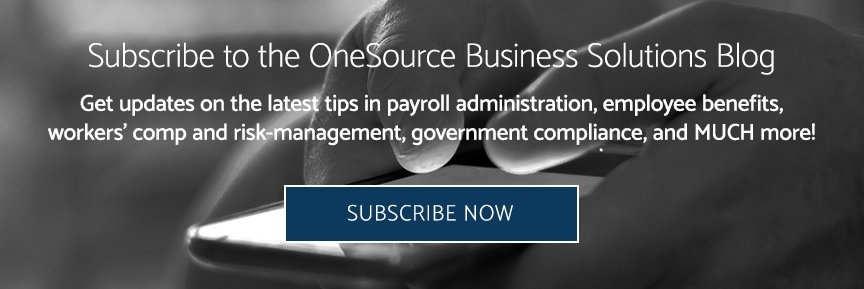OneSource Business Solutions Blog
How to Do HR Without an HR Department

Human resources is the lifeblood of your business. It's the magic glue that keeps your employees engaged, productive, and happy. It's the platemail-wearing guard that keeps regulatory bodies from imposing fines and restrictions on your business.
Having your own, on-site HR department provides overwhelming benefits, but that's not always possible. The average salary of a single HR pro is between 50 and 80 thousand dollars. Trying to build a team of HR pros is a costly endeavor. Your business may not have the liquidity or scale to onboard HR pros yet.
So, what are your options?
You can do it yourself (DIY), hand HR responsibilities on an ad-hoc basis to other employees, or partner with an HR outsourcing company.
Usually, outsourced HR partners are meant to work with existing HR staff. In these situations, your outsourced partner reduces departmental burdens, tackles labor-intensive processes, and frees up your HR team to focus on growth-bearing initiatives. But if you're not in a position to onboard a well-trained HR team, finding an outsourced HR partner that can scale to your needs is the only viable solution at your fingertips.
Human Resource Tasks
HR is a massive bucket of responsibilities that touches virtually every layer of your workforce, strategy, and finances. Some of the most common time-consuming HR tasks include:
- Payroll processing: Payroll — which includes issuing payments, handling deductions, remittance, taxes, and time-consuming tasks like providing wage statements — is a major source of pain for small business owners. Not only do payroll mistakes send employees running to the door ( ~50% of employees will begin looking for a new job after just two payroll errors), but the average small business owner spends 5 hours per pay period simply on taxes. When you factor in calculating, issuing, and recordkeeping, payroll is a major time sink.
- HR administration: From maintaining records to reporting and answering benefits questions, HR administration is a vast pool. Nearly one out of every two small business owners spends at least one day per week dealing with HR administration.
- HR compliance: 39% of small business owners spend at least 10 hours per month rifling through regulations. Unfortunately, that's often not enough. 40% of small businesses face IRS penalties each year, and thousands of others deal with OSHA penalties, labor issues, and local fines.
- Risk management: Risk is everywhere. 57% of senior execs at large businesses rank risk management as the category they feel least prepared to address, and they have access to a nearly unlimited supply of employees and liquidity. For small businesses, risk gets real. Not only do you have to pay more for workers' comp insurance than large businesses, but the convergence of employee and regulatory risks can feel crushing. HR deals with the bulk of that risk.
- Employee benefits: Small businesses pay 18% more for benefits. That's a problem. 83% of employees admit that benefits keep them at their jobs. Without best-in-class benefits packages, you will struggle to attract and retain top talent. But benefits can get expensive. And if there's one thing that small businesses aren't drowning in, it's capital.
With these problems in mind, let’s look at the issues with common solutions.
The Problem with DIY Human Resources
As a small business owner, you're used to juggling responsibilities. There's a good chance you work over 40 hours a week, and you certainly have drive, a mission, and dreams. But Do It Yourself (DIY) human resources isn't only time-consuming and growth-prohibiting, it's extremely risky.
Human resources deals with hundreds of local, state, and federal laws while handling employee strategy, planning, and payroll. Simply put, that's too much for any one person to handle while also running an entire business.
Even if you could handle it effectively, why would you want to? HR is time-consuming. As a business leader, you should be focused on growth and profits — not redundant paperwork and "legalese." When you handle HR solo, you incur costs. From a reduction in revenue-generating time to the cost of increased benefits, every business leader should be outsourcing or hiring HR away. In a nutshell, your time is far too valuable to waste away on administration.
The Problem with Tasking Employees with Multiple Departments
Many business owners who can't afford to hire a full suite of HR pros simply delegate HR responsibilities to their existing staff. As many as 70% of businesses push HR responsibilities off onto staff members with little-to-no HR experience. Again, this can lead to some serious issues. Not only is HR a full-time job that requires expertise, focus, and experience, but HR mistakes can cost your business a significant amount of time and money.
HR is the fishing lure that attracts top talent. Simple mistakes can cost you the big fish. A single payroll error can lead to unhappy employees and significant IRS fines. Acquiring poor or overpriced benefits can hurt your bottom line, send employees packing, and make you appear less attractive in the talent marketplace. Compliance issues can result in fines, reputation damage, and (in the worst-case scenario) criminal charges. Every missed HR opportunity can inhibit growth and stall operations.
In other words, HR isn't simple. It's an incredibly complex web of responsibilities. Trying to force employees with minimal experience to tackle these incredibly energy-draining activities is a surefire recipe for disaster.
Outsourcing Administration
Given the pure scope of human resources, it shouldn't be surprising that 80% of companies outsource HR. Luckily, there are a variety of outsourced HR options for small businesses.
Out of these, there is only one outsourced HR partner that's nimble enough to save you money on benefits and workers' compensation and scalable enough to handle nearly any HR administrative need.
The PEO Advantage
Professional Employer Organizations (PEOs) are outsourced HR partners that can help you tackle various HR tasks like administration, compliance, and benefits. Unlike other outsourced HR partners, PEOs are capable of using economies-of-scale pricing to secure Fortune 500 benefits at Fortune 500 prices for small businesses. In addition, PEOs offer access to world-class, pay-as-you-go workers' compensation plans with no down payment.
A reputable PEO will have the scalability and agility you need to create a customized HR outsourcing plan specifically for your business. The average small business sees a 27% ROI when working with a PEO. Even if we exclude payroll, compliance, and risk-reduction, PEOs provide a positive ROI on cost savings from administration, benefits, and workers' compensation.
You Can't DIY HR
Tackling HR yourself wastes time, resources, growth-potential, and money. Worse yet, it can result in fines, penalties, and compliance headaches. Instead, small business owners that aren't ready to onboard their own HR team should look towards PEOs. Not only do PEOs have the most scalability and cost-reduction capabilities of any outsourced HR partner, but they're the only outsourced partner that can give you competitive benefits and workers' compensation.
The truth is: HR is hard.
You don't have to handle it alone.
Recent Posts
Posts by Topic
- HR Outsourcing (37)
- Employee Benefits (14)
- Payroll & HR Administration (5)
- Strategic Planning & Research (5)
- Company Culture (4)
- HR Compliance (4)
- Industry – Professional Services (4)
- PEO (4)
- Workers’ Comp (4)
- Employee Turnover (3)
- OneSource PEO Company News (3)
- performance management (2)
- Navigating COVID-19 (1)
- manufacturing industry (1)
